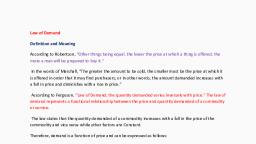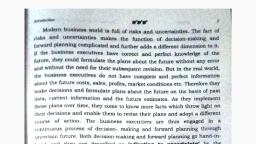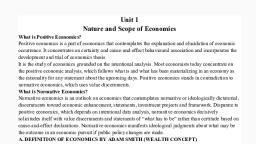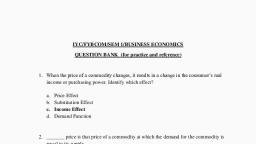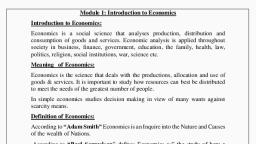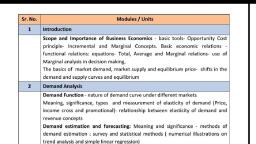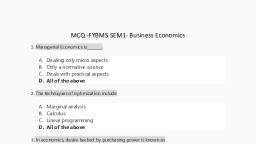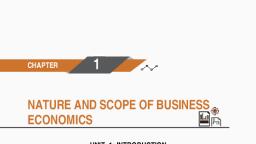Page 1 :
Business Economics, , Business Economics, also referred to as Managerial Economics, generally refers to the, integration of economic theory with business practice., , While the theories of Economics provide the tools, which explain various concepts such as, demand, supply, costs, price, competition etc., Business Economics applies these tools in the, process of business decision making, , Business Economics Definition, , Definition of economics by different economists have a different point of view, but the essence, is the same. The following are some popular definition of business economics., , 1.Managerial economics is concerned with the application of economic concepts and, economics to the problems of formulating rational decision making Mansfield., , 2.Managerial economics is concerned with the application of economic principles and, methodologies to the decision-making process within the firm or organization. It seeks to, establish rules and principles to facilitate the attainment of the desired economic goals of, management Douglas., , Scope of Business Economics, , The scope of business economics is quite wide. Business economics involves the application of, various economic tools, theories, and methodologies for analyzing solving different business, problems., , Two Categories- There are two categories of business issues to which economic theories can, be directly applied, namely:, , 1.Microeconomics applied to internal or operational issues, , 2.Macroeconomics applied to external or environmental issues, , Therefore, the scope of Business Economics may be discussed under the above two heads, The following Microeconomic theories deal with most of these issues., , 1.Demand analysis and forecasting: Demand analysis is a process of identifying potential, consumers, the amount of goods they want to purchase, and the price they are willing to pay for, it. This process is important for an organisation to analyse the demand for its products, and to, produce accordingly and helping organisations in business planning and deciding on strategic, issues., , ca Edit with WPS Office
Page 2 :
2.Cost and benefit analysis (CBA): By analysing costs, management can estimate costs, required for running the organisation successfully., , Cost analysis helps firms in determining hidden and uncontrollable costs and taking measures, for effective cost control. Also, help in determine the return on investment (ROI)., , 3. Pricing decisions, policies, and practices: Pricing is one of the key areas of business, economics. It is a process of finding the value of a product or service that an organisation, receives in exchange for its product/service. The profit of an organisation depends a great deal, on its pricing strategies and policies. Business economics includes various pricing-related, concepts, such as pricing methods, product-line pricing, and price forecasting., , 4. Profit maximisation: Profit generation and maximisation is the main aim of every, organisation (except for non-profit organisations)., , In order to maximise profit, organisations need to have complete knowledge about various, economic concepts, such as profit policies and techniques, and break-even analysis., , 5.Capital management: Organisations often find it difficult to make decisions related to capital, investment. These decisions require sound knowledge and expertise in various economic, aspects.To make sound capital investment decisions, an organisation needs to determine, various aspects, such as the cost of capital and rate of return., , 6.Risk and Uncertainty Analysis: Business - rms generally operate under conditions of risk and, uncertainty. Analysis of risks and uncertainties helps the business firm in arriving at efficient, decisions and in formulating plans on the basis of past data, current information and future, prediction., , The major scope of business macroeconomic factors relate to:, , * The type of economic system stage of business cycle is the general trends in national, income, employment, prices, saving and investment., , * Government's economic policies like industrial policy, competition policy, monetary and, - fiscal policy, price policy, foreign trade policy and globalization policies. Working of, - nancial sector and capital market, , * Socio-economic organisations like trade unions, producer and consumer unions and, cooperatives. Social and political environment: Business decisions cannot be taken, without considering these present and future environmental factors., , * Business decisions cannot be taken without considering these present and future, environmental factors. As the management of the fi- rm has no control over these, factors, it should - ne-tune its policies to minimise their adverse effects, , ca Edit with WPS Office
Page 3 :
Importance of Business Economics, , e Business economics plays an important role in decision making in an organisation., Decision making is a process of selecting the best course of action from the available, alternatives. Role and responsibilities of managerial economics are explained below., , The following points explain the importance of business economics:, , 1. Business economics covers various important concepts, such as Demand and Supply, analysis; Short run cost and Long run costs; and Law of Diminishing Marginal Utility., These concepts support managers in identifying and analysing problems and finding, solutions., , 2. helps managers to identify and analyse various internal and external business factors, and their impact on the functioning of the organisation., , 3. economics helps managers in framing various policies, such as pricing policies and, cost policies, on the basis of economic study and findings.By studying various economic, variables, such as cost production and business capital, organisations can predict the, future., , 4. economics helps in establishing relationships between different economic factors, such, as income, profits, losses, and market structure. This helps in guiding managers in, effective decision making and running the organisation., , ca Edit with WPS Office
